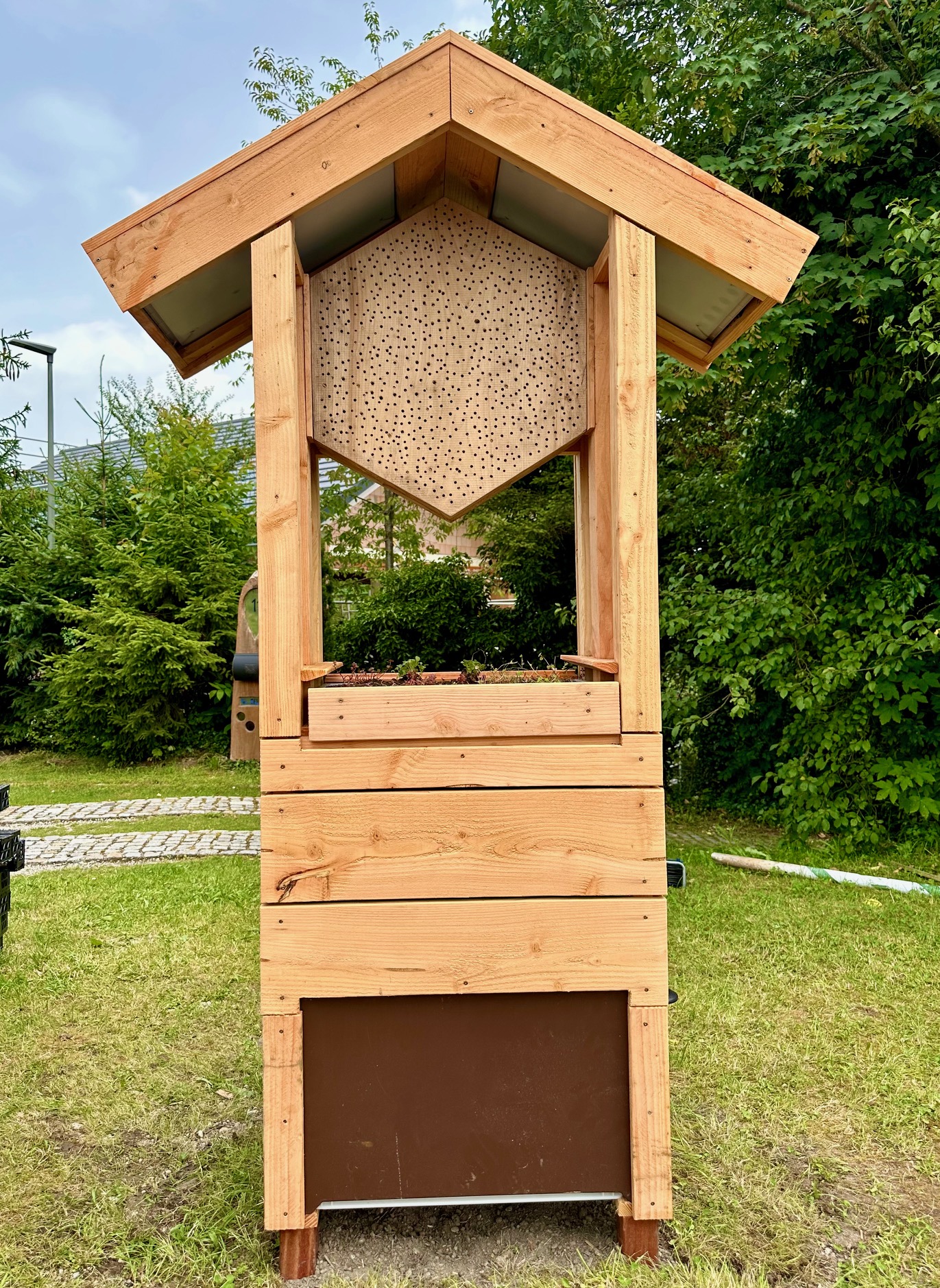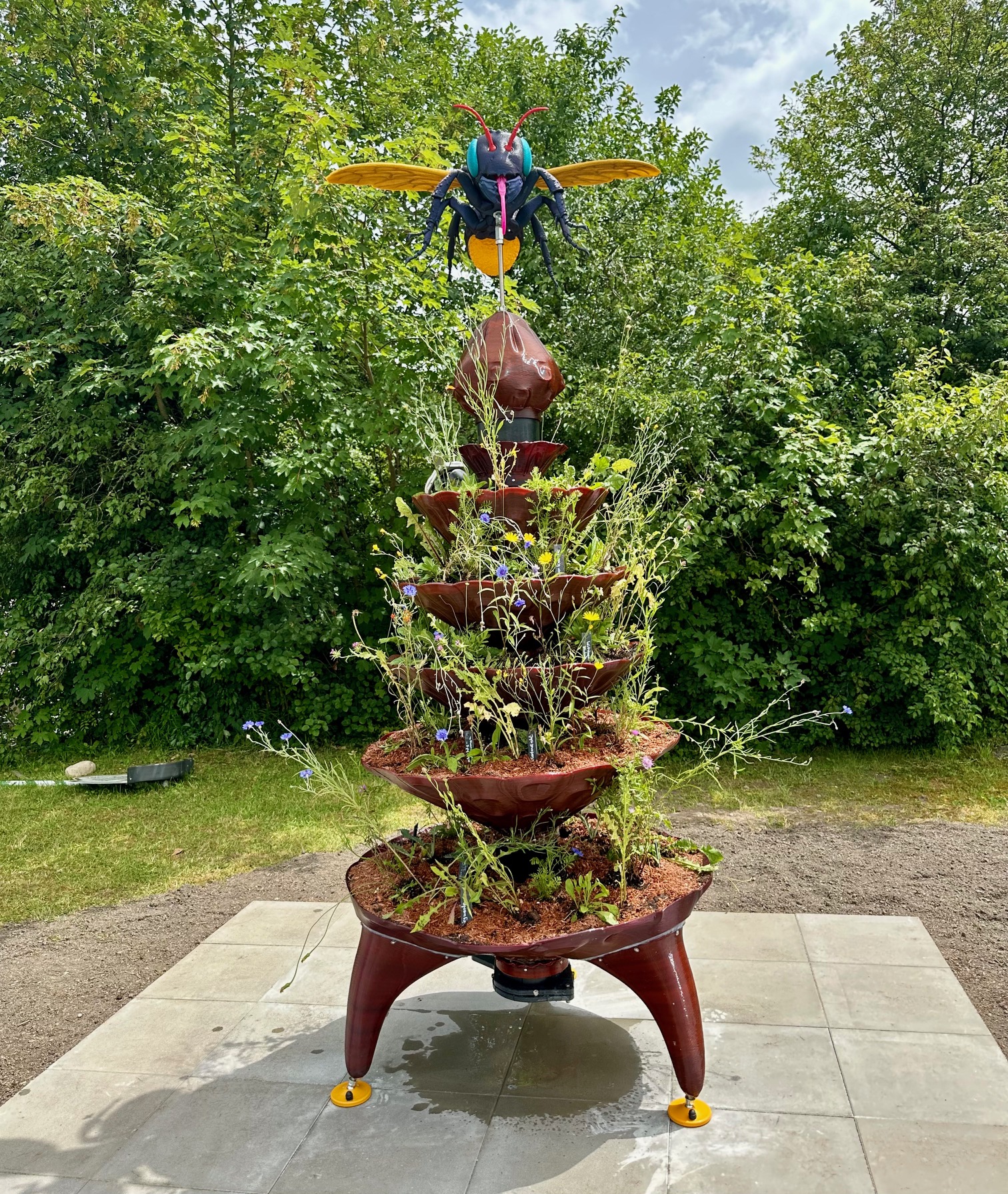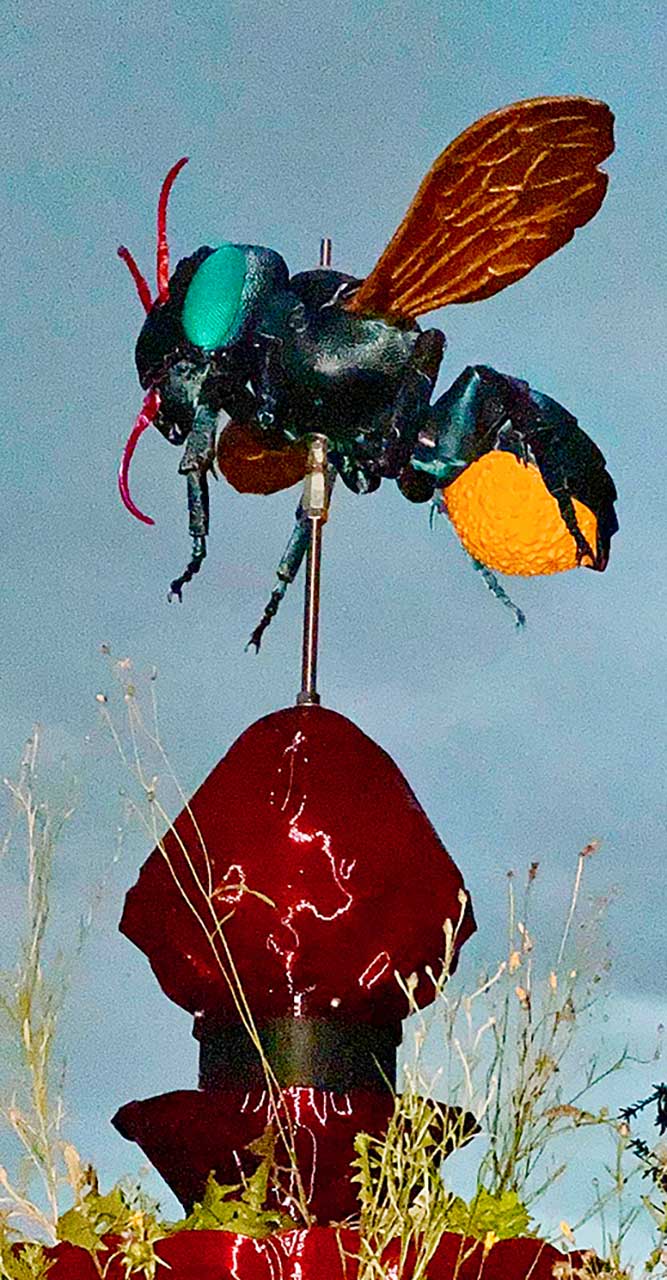Orange-vented Mason Bee
Osmia leaiana
Appearance
They are between 8 and 10 millimetres in size, hairs are longer and whitish except for the bright orange-red belly brush on the head shield and back, legs are short-haired, abdomen is sometimes with a metallic blue or green sheen, males have green eyes.
Special features
These solitary bees are widespread but rare. They are oligolectic, pollen specialists which are restricted to one plant genus or plant family. They pollinate the varieties of flowers as described further down on this page. The flight time of the species in Central Europe is from May to August. Food supply should not be too far away from their nests, that means a pollination radius of up to 1 km. Choice of nest: existing tunnels in dry wood and in hollow plant stems. They use chewed leaves as plant mortar for building material in the brood cells.
Interesting facts
The Orange-vented Mason Bee harbours cuckoo bees, the Plain Dark Bee Stelis phaeoptera and the Banded Dark Bee, Stelis punctulatissima, which are endangered and rare. The best way to help cuckoo bees is to support their host bees and their habitats. Cuckoo bees are brood parasitic in the nests of pollen-collecting bees. Other parasites are species of the solitary Sapygid wasp Sapyga quinquepunctata and the Yellow-spotted Sapyga, Sapyga clavicornis.
Physical location of the BeeTotem
Klosterstrasse corner Salzachstrasse, (at the Mitfahrbankerl) Scheuerhof, Raitenhaslach, Burghausen, Upper Bavaria, Germany DMS Coordinates 48º08’11.08″ N 12º47’26.84″ E.
Beetotem and Beehotel
BeeTotem and BeeHotel for the Orange-vented Mason Bee
The Orange-vented Mason Bee is also a RefuBee and needs food and protection. It has been identified by local wild bee specialists at the Bavarian Academy for Nature Conservation and Landscape Management and the Haus der Natur in Salzburg as a wild bee threatened with extinction. BeeTotem and BeeHotel have therefore been specially developed for this specific bee. For the Orange-vented Mason Bee, this means an above-ground BeeHotel with 10 cm deep holes with a diameter of 4.5 to 5.5 mm, which remains completely dry and utilises the morning sun in spring.
In addition, this bee hotel is connected to a worm hotel in a single object and is the first experiment to combine the two. With a large number of host families wanting to utilise their organic kitchen waste, the worm hotel provides an alternative to the food for the worms in the BeeTotem. A water bank is also installed in the immediate vicinity. It collects rainwater via a gutter and can hold up to 220 litres of water, which can be pumped out if necessary.
It is of utmost importance that the host families and their neighbours grow in their gardens and on their balconies the bee species plants, listed on this page. In this way, a clan of the Orange-vented Mason Bee will form in the neighbourhood and the residents will help to create an effective biotope that will help to prevent the extinction of this species
Plants vor the
Orange-vented Mason Bee
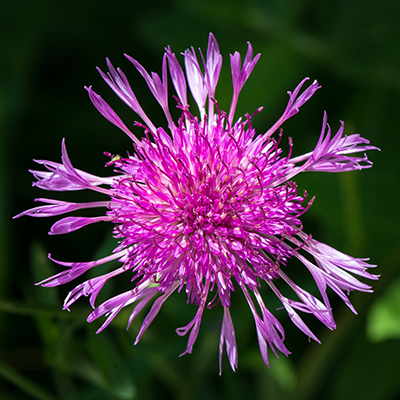
Wiesen-Flockenblume
| Latein | Centaurea jacea |
| Umgebung | Sonnig |
| Grösse | 30 -60 |
| Platzierung | ? |
| Platform | ? |
| Blühzeit | Juni-Oktober |
| Lebensdauer | mehrjärig |
| Boden | lehmig, mäßig |
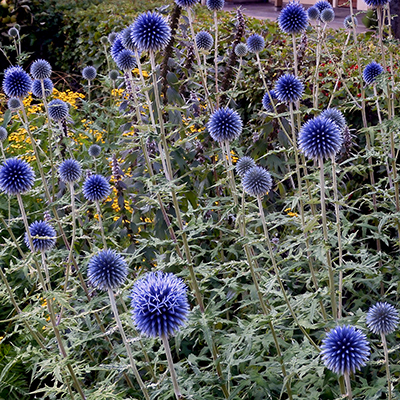
Kugeldistel
| Latein | Rorippa sylvestris |
| Omgeving | Zonnig |
| Grootte | 45 cm |
| Plaatsing | B |
| Platform | 1 |
| Bloei | Lente-Zomer |
| Levensduur | Vaste plant |
| Aarde | Klei |
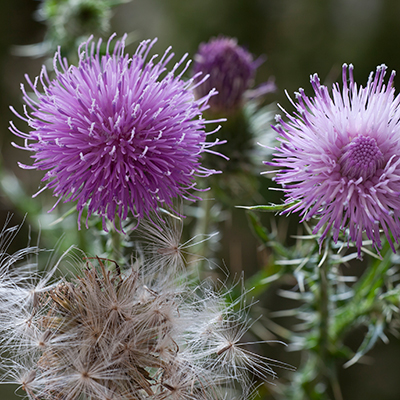
Weg-Distel
| Latein | Geranium pyrenaicum |
| Omgeving | Zonnig |
| Grootte | 20-60 cm |
| Plaatsing | F |
| Platform | 5 |
| Bloei | April-September |
| Levensduur | Vaste plant |
| Aarde | Ruderaal |

Habichtskraut
| Latijn | Tanacetum vulgare |
| Omgeving | Zonnig |
| Grootte | 60-120cm |
| Plaatsing | D |
| Platform | 1 |
| Bloei | Juli-September |
| Levensduur | Vaste plant |
| Aarde | Ruderaal |
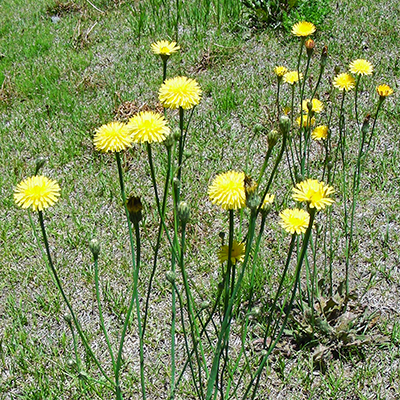
Gewöhnliches Ferkelkraut
| Latein | Glebionis segetum |
| Omgeving | Zonnig |
| Grootte | 30-60cm |
| Plaatsing | E |
| Platform | 1 |
| Bloei | Juni-September |
| Levensduur | 1-jarig |
| Aarde | Kalkarm |

Wiesen-Pippau
| Latein | Veronica chamaedrys |
| Omgeving | Half schaduw |
| Grootte | 10-40 cm |
| Plaatsing | G |
| Platform | 4 |
| Bloei | Mei-Juni |
| Levensduur | Vaste plant |
| Aarde | Voedselrijk |

Weidenblättriges Ochsenauge
| Latein | Hypochaeris radicata |
| Omgeving | Zonnig |
| Grootte | 20-60 cm |
| Plaatsing | H |
| Platform | 2 |
| Bloei | Juni-September |
| Levensduur | Vaste plant |
| Aarde | Voedselrijk |
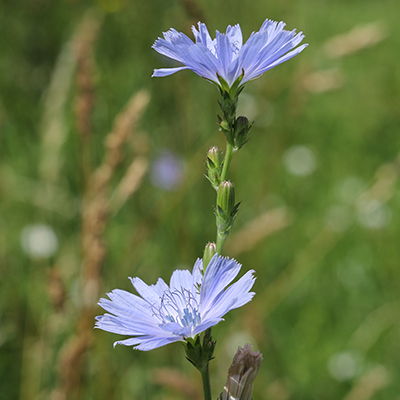
Gewöhnliche Wegwarte
| Latijn | Calendula officinalis |
| Omgeving | Zonnig |
| Grootte | 25-40cm |
| Plaatsing | I |
| Platform | 2 |
| Bloei | Mei-Oktober |
| Levensduur | 1-jarig |
| Aarde | Akker |
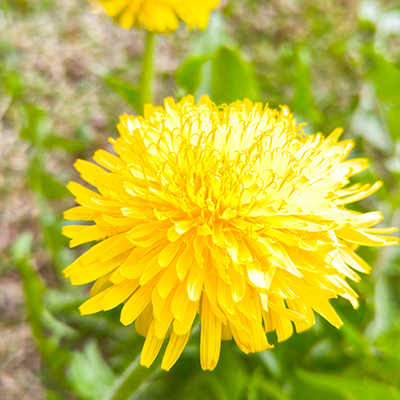
Löwenzahn
| Latein | Berteroa incana |
| Omgeving | Zonnig |
| Grootte | 20-50cm |
| Plaatsing | J |
| Platform | 3 |
| Bloei | Juni-September |
| Levensduur | 1-jarig |
| Aarde | Akker |

Kornblume
| Latein | Malva sylvestris |
| Omgeving | Vochtig/Half schaduw |
| Grootte | 30-120 cm |
| Plaatsing | K |
| Platform | 4 |
| Bloei | Juni-Okt |
| Levensduur | 2-jarig |
| Aarde | Voedselrijk |

Benediktendistel
| Latein | Pulicaria dysenterica |
| Omgeving | Nat |
| Grootte | 60-90 cm |
| Plaatsing | L |
| Platform | 5 |
| Bloei | Juli-September |
| Levensduur | Vaste plant |
| Aarde | Brak |

Färberkamille
| Latijn | Sinapis arvensis |
| Omgeving | Zonnig |
| Grootte | 30-80cm |
| Plaatsing | M |
| Platform | 5 |
| Bloei | ? |
| Levensduur | 1-jarig |
| Aarde | Klei |
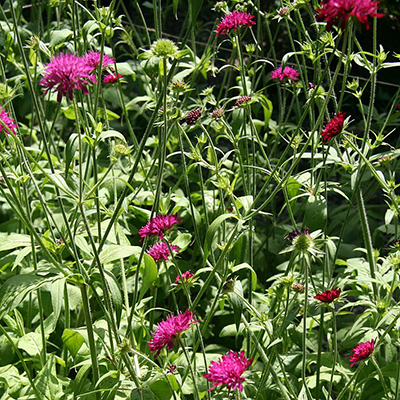
Scabiosen / Witwenblumen
| Latein | Glechoma hederacea |
| Omgeving | Halfschaduw |
| Grootte | 20-50cm |
| Plaatsing | N |
| Platform | 4 |
| Bloei | April-Mei |
| Levensduur | Vaste plant |
| Aarde | Alles |

Gewöhnliche Kratzdistel
| Latein | Helichrysum italicum |
| Omgeving | Zonnig |
| Grootte | 15-60 cm |
| Plaatsing | O |
| Platform | 1 |
| Bloei | Juli-September |
| Levensduur | Houtige dwerg heester |
| Aarde | Ruderaal |

Acker-Kratzdistel
| Latein | Crepis capillaris |
| Omgeving | Zonnig |
| Grootte | 30-90 cm |
| Plaatsing | P |
| Platform | 4 |
| Bloei | Juni-November |
| Levensduur | 1-2 jarig |
| Aarde | Voedselrijk |
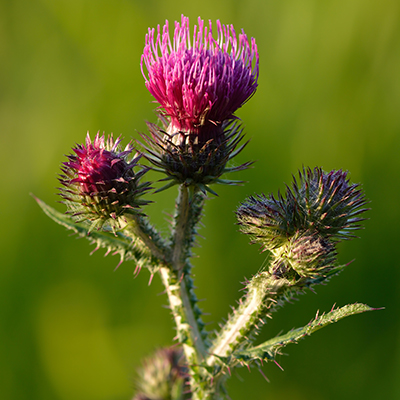
Krause Ringdistel
| Latijn | Sinapis arvensis |
| Omgeving | Zonnig |
| Grootte | 30-80cm |
| Plaatsing | M |
| Platform | 5 |
| Bloei | ? |
| Levensduur | 1-jarig |
| Aarde | Klei |

Gewöhnliche Eselsdistel
| Latein | Centaurea jacea |
| Omgeving | Alles |
| Grootte | 30-70cm |
| Plaatsing | Q |
| Platform | 3 |
| Bloei | Juni-September |
| Levensduur | Vaste plant |
| Aarde | Alles |
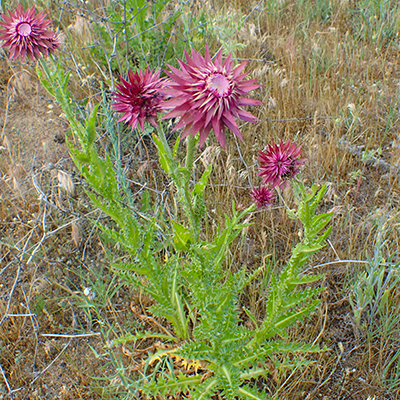
Nickende Distel
| Latein | Echinops sphaerocephalus |
| Omgeving | Zonnig |
| Grootte | 60-120 cm |
| Plaatsing | R |
| Platform | 3 |
| Bloei | Juni-Augustus |
| Levensduur | Vaste plant |
| Aarde | Klei |
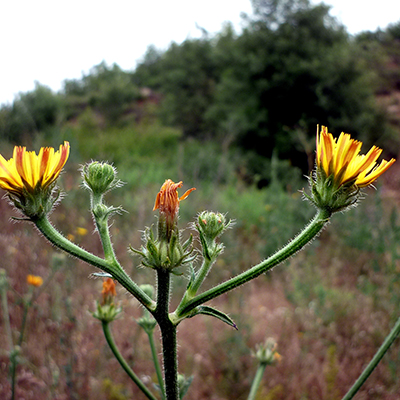
Gewöhnliches Bitterkraut
| Latein | Leucanthemum vulgare |
| Omgeving | Zonnig |
| Grootte | 30-60 cm |
| Plaatsing | S |
| Platform | 3 |
| Bloei | Mei-Augustus |
| Levensduur | Vaste plant |
| Aarde | Matig voedselrijk |
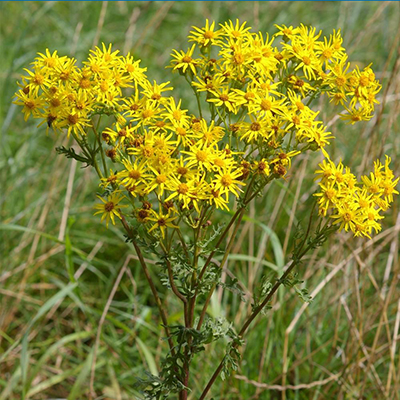
Jakobs-Greiskraut
| Latijn | Potentilla norvegica |
| Omgeving | Halfschaduw |
| Grootte | 15-50cm |
| Plaatsing | T |
| Platform | 2 |
| Bloei | Juni-Augustus |
| Levensduur | Vaste plant |
| Aarde | Voedselrijk |
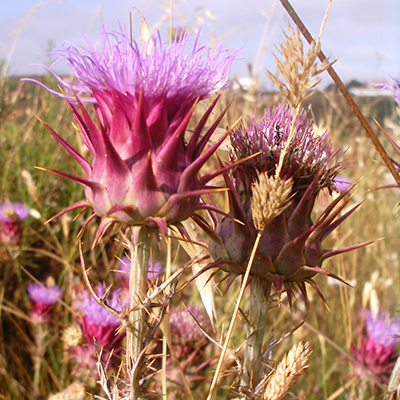
Artischocke
| Latein | Taraxacum officinale |
| Omgeving | Halfschaduw |
| Grootte | 5-40cm |
| Plaatsing | U |
| Platform | 4 |
| Bloei | Maart-Mei / Sept -Nov |
| Levensduur | Vaste plant |
| Aarde | Voedselrijk |

Silberdistel, Eberwurz
| Latein | Tripleurospermum perforat |
| Omgeving | Halfschaduw |
| Grootte | 20-50 cm |
| Plaatsing | V |
| Platform | 4 |
| Bloei | Juni-Oktober |
| Levensduur | 1-2 jarig |
| Aarde | Voedselrijk |

Golddistel, Gemeine Eberwurz
| Latein | Ranunculus acris |
| Omgeving | Zonnig |
| Grootte | 30-90 cm |
| Plaatsing | W |
| Platform | 5 |
| Bloei | April-Oktober |
| Levensduur | Vaste plant |
| Aarde | Voedselrijk |
Extra
Information
On this BeeTotem

QR code
This QR code is printed on the information tile on this BeeTotem and on the information board at the corresponding BeeHotel. Anyone who scans this code with their mobile phone will be redirected to this website for further information. At the same time, people are asked to discover bees, photograph them and upload these photos to this page. Everyone who takes part in this process supports a direct evaluation process.
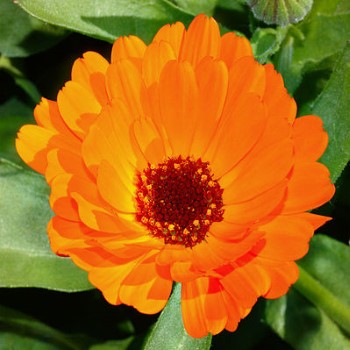
Biologic plants for sale
It is very important that the plants are of organic quality and come from native varieties wherever possible.
We share Rici Schönerl’s dream of creating more biodiversity for plants, animals and people with flourishing vegetation. Rici is an organic breeder of native wild plants. You can order plants and seeds.

Plant layout
For each plant information you can see where it can be placed in the Bee Totem. Download the overview here
KARMAGOTCHI
Address:
Amsterdam
Email us :
info@refubees.org
Call us:
+31 6 553 563 43
Bee social
Information
Privacy
